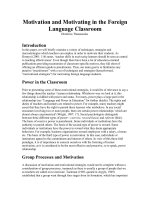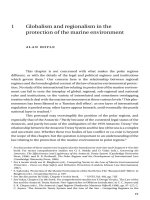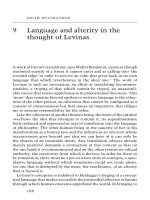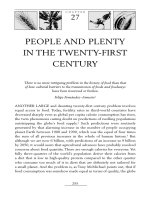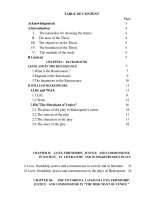Language and emotion in the bilingual brain
Bạn đang xem bản rút gọn của tài liệu. Xem và tải ngay bản đầy đủ của tài liệu tại đây (1.11 MB, 42 trang )
Language and Emotion in the
Bilingual Brain
Catherine L. Harris, Ph.D.
Boston University
Department of Psychology
1
Observation: Bilingual speakers report
that sexual references and swear words
evoke less anxiety when uttered in a
second language
Are swear words in L2 like “play money”?
Is this effect limited to taboo words?
Which language do you pray in?
Say “I love you”? Share a confidence?
Hypotheses
L1 is the language of emotional
expressiveness.
L2 is the language of emotional distance
Consistent: Code-switching in therapy
Inconsistent: Japanese native speakers frequently enjoy swearing in
English.
Unclear:
“I’m a different person when I speak Mandarin…”
Outline of Talk
What is going on with the bilingual brain and emotion-laden
expressions?
What are the research traditions?
■
■
■
■
Autobiographies of bilingual writers
Laboratory studies of bilingual memory
Interview data on perceived emotional force
Psychophysiological monitoring
What are the implications for classroom learning?
Autobiographies of Bilingual Writers
What does it mean to feel like two different people in your two
languages?
Insights from language-learning narratives of immigrants
who became adept writers in their second language:
“River” in Polish was a vital sound, energized with the
essence of riverhood, of my rivers, of my being immersed
in rivers. “River” in English is cold -- a word without an
aura. It has no accumulated associations for me, and it
does not give off the radiating haze of connotation.
Eva Hoffman, 1989, Lost in Translation: A life in a new language
Studies of Bilingual Memory
Methods
Cued recall: provide cue word, asked to think of an
autobiographical event associated with the cue.
Memories cued in the first language are earlier on
average than memories cued in the second
language.
Cues in the first language tap into first-language/
first-culture memories. Cues in the second language
activate more recent memories.
Memories are more easily accessed by the language
used at the time of the encoding.
Studies of Bilingual Memory
Free recall: Participants generate memories from a
time period (early childhood) or a period which is
dominated by one language.
A sk a question in a specific language (and require response in
that language): Bilinguals speak at greater length
about embarrassing topics in their second
language.
The language in which a memory is
encoded is a stable feature of the
memory
(Schrauf 2000)
Results of Studies of Bilingual
Memory
■
Immigrants' memories for childhood or
adolescence spent in the home country
are more numerous, detailed, and
emotionally charged when described in
native language than when
discussed in the second language.
Schrauf (2000)
Get Your Intuitions Engaged
Why do some bilinguals prefer swearing in their first language?
But some prefer swearing in their second language...
Interview Data on Perceived
Emotional Force
Multi-method study: Internet,classroom survey, face-to-face
interview
■
■
■
Bilingual and multilingual respondents answered
questions about what the emotional force of
hearing and uttering swear words and other
emotional language in each of their languages
1039 respondents (272 trilinguals, 289 quad, and 340 penta)
Collected demographic data: age, gender,
education, age and context of language learning
(Dewaele and Foth, 2003, UK)
Perceived Force of Swearwords Declines
With Each Language Learned
More
Forceful
4.5
4
3.5
3
2.5
2
L1
L2
L3
L4
L5
Minimal Effects of Education
More
Forceful
4.5
4
Alevel
BA
MA
PhD
3.5
3
2.5
2
L1
L2
L3
L4
L5
Females Rate Swearwords As More
Forceful Than Males (except L5)
More
Forceful
4.5
4
3.5
F
M
3
2.5
2
L1
L2
L3
L4
L5
Perceived Force of Swearwords Greater
for Naturalistic Learning Context
More
Forceful
4
3.8
3.6
3.4
3.2
3
2.8
2.6
2.4
2.2
2
Instructed
Mixed
Naturalistic
L2
L3
L4
L5
What Participants Said...
Estela, Romanian L1, German L2, French L3, English L4,
Italian L5
Romanian is more appropriate for hurting and insulting
because it carries more weight and I can distinguish
more nuances
Maureen, English L1, Italian L2
I prefer to express my anger in Italian because I do
not hear the weight of my words so everything comes
out quite easily. Which unfortunately means I probably
hurt people more than I intend to!
Why Do Some Speakers Prefer
Swearing in L1, and some in
L2?
■
Speakers always rate swearwords as having greater emotional
force in higher-rank languages.
■
If the high emotion of a first language is desired, then one prefers
to swear in L1.
■
If the arousal is aversive, then one prefers to swear in L2.
Moving Beyond Self-Report...
Is Skin Conductance Higher for Emotion Words in the Second
Language?
öpücük
kiss
The
Autonomic
Nervous
System
Engages
the
Amygdala
Taboo words
elicit large skin
conductance
amplitudes in
monolingual
speakers.
Neuroimaging
indicates
amygdala
involvement
(Lebar and Phelps,
1998)
Psychophysiological Monitoring:
Skin Conductance Amplitudes
■
Measures autonomic arousal (apprehension of threat; polygraph)
10 seconds
table
shit
joy
Stimuli and Procedure
■
Auditory or written on computer screen
■
Judged words for unpleasantness
■
Mild to moderate taboo words
breast
■
■
asshole
Neutral, negative, positive words
Reprimands
Shame on you!
Go to your room!
32 Turkish-English bilinguals
Acquired English age 12-25
Arrived in the US after age 17
Reprimands and Taboo Words Elicit Greater
Reactivity in a First Language
0.08
Turkish (L1)
0.07
0.06
0.05
0.04
English (L2)
0.03
Neutral
Positive
Negative
Reprimands
Taboo
Harris, Ayçiçegi, Gleason (in press, A pplied Psycholinguistics)
Auditory Language More
Arousing in L1
0.06
Turkish (L1)
0.05
English (L2)
0.04
Auditory
Visual
Presentation Modality
Why is the first language
more emotional?
Learning a language early promotes heightened
emotionality of L1 compared to L2 because:
■
Family context of learning
■
First language learning co-evolves with emotional
regulation systems
■
L1 has greater connections with subcortical brain
structures which mediate arousal (including
amygdala-mediated learning)

